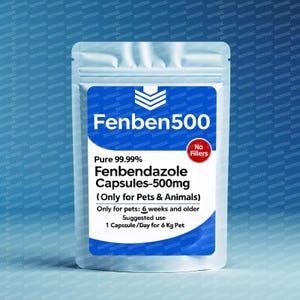fenbendazole 222: Frequently Asked Questions
Wiki Article
Comprehending the Advantages and Uses of Fenbendazole in Vet Medication
Fenbendazole has developed itself as a crucial anthelmintic in vet medicine. Its capability to target different parasitical infections makes it a useful device for vets. The drug's system disrupts necessary mobile processes in parasites, resulting in efficient therapy end results. However, its safety profile varies between types, demanding cautious consideration in its usage. Understanding these characteristics can drop light on fenbendazole's wider effects in vet treatment and continuous study right into its potential beyond conventional applicationsMechanism of Action of Fenbendazole

Typical Parasitical Infections Treated With Fenbendazole
A selection of parasitic infections are effectively treated with fenbendazole, making it a functional alternative in veterinary medication. This anthelmintic agent is specifically reliable versus nematodes, consisting of roundworms and hookworms, which generally affect pets and pet cats. It is additionally used for the therapy of cestodes, such as tapeworms, providing a wide spectrum of action against both types of digestive tract bloodsuckers. In addition, fenbendazole is helpful in taking care of infections triggered by protozoa, especially Giardia, which can cause gastrointestinal distress in animals. Its efficacy extends to dealing with specific lungworms in canines and felines, addressing respiratory system wellness concerns linked to these bloodsuckers. Generally, fenbendazole's capability to target numerous parasitical species makes it an important tool in veterinary method, making certain the health and health of pet dogs influenced by these typical infections.Safety and security and Effectiveness in Various Pet Types
The security and efficacy of fenbendazole vary amongst different animal species, underscoring the importance of species-specific factors to consider in vet medication. In canines, fenbendazole is usually well-tolerated and efficient versus a series of gastrointestinal parasites, consisting of roundworms and hookworms. For felines, nevertheless, its use is much less usual and may call for cautious application because of potential damaging reactions.In animals, such as cattle and sheep, fenbendazole shows performance against different endoparasites, adding to boosted health and productivity. The pharmacokinetics and prospective side results can vary noticeably between species, demanding careful evaluation by veterinarians.
Equines additionally respond favorably to fenbendazole, specifically for dealing with strongyles and ascarids, though dosage and administration courses should be customized to their unique physiology. Comprehending these differences is crucial for optimizing therapy outcomes and ensuring animal welfare across diverse types.
Management and Dosage Guidelines
Proper management and dosage standards are crucial for optimizing the healing impacts of fenbendazole while lessening prospective adverse effects. The dosage typically varies relying on the species being dealt with, the particular problem, and the formulation of fenbendazole utilized. fenbendazole 444. For pet dogs and felines, a typical dose is 50 mg/kg body weight, carried out daily for 3 successive days, however vets may adjust this based on private health evaluationsIt great site is very important to provide fenbendazole with food to enhance absorption these details and lessen intestinal upset. The medication is readily available in various types, including granules and paste, permitting flexible administration options. Checking the animal's feedback during and after treatment is advisable to confirm effectiveness and safety and security. In addition, veterinary support is important to establish the appropriate period of treatment based upon the kind of parasitical infection being resolved, assuring excellent results for the pet's wellness.
Future Perspectives and Research on Fenbendazole
Research on fenbendazole proceeds to evolve, focusing on its potential applications past traditional antiparasitic usages. Current researches have discovered its performance in treating various kinds of cancer cells, especially in vet oncology. Initial information suggest that fenbendazole might prevent the development of tumor cells and enhance the effects of various other chemotherapeutic agents.Scientists are exploring its role in taking care of intestinal problems in animals, highlighting its anti-inflammatory residential properties. The versatility of fenbendazole for different species increases inquiries about its security accounts and ideal application routines in varied populations.
As passion expands, there is a requirement for detailed professional tests to look at this website develop evidence-based guidelines for these novel applications. Future research study might also examine the mechanisms behind fenbendazole's results, potentially paving the means for innovative therapeutic methods in vet medication. The ongoing exploration of fenbendazole can substantially boost therapy alternatives for different veterinary problems.

Often Asked Inquiries
Is Fenbendazole Safe for Pregnant Animals?
The safety and security of fenbendazole for expectant animals remains unsure. While some researches suggest very little risk, veterinarians commonly suggest caution and often recommend against its use during maternity unless the advantages plainly outweigh potential dangers.Can Fenbendazole Be Made Use Of in Animals?
Fenbendazole is frequently made use of in livestock to deal with different parasitical infections. fenbendazole. Its efficiency versus intestinal worms makes it a beneficial anthelmintic, contributing to boosted wellness and efficiency in pets raised for food and fiberWhat Are the Side Results of Fenbendazole?

The side impacts of fenbendazole might include stomach disruptions, lethargy, and allergies. In rare situations, much more severe reactions can take place, requiring cautious tracking and examination with a vet throughout treatment.
Just How Does Fenbendazole Compare to Other Dewormers?
Fenbendazole offers broad-spectrum effectiveness against various bloodsuckers, frequently comparing favorably to various other dewormers. Its one-of-a-kind mechanism targets different life stages, making it efficient, while normally offering a favorable security account compared to alternatives available on the market.Can Fenbendazole Be Utilized for Treating Cancer in Family Pets?
The possibility of fenbendazole in treating cancer in pet dogs has gathered rate of interest. Preliminary studies recommend it may prevent cancer cells cell growth, however further study is essential to verify its effectiveness and safety in vet oncology.Report this wiki page